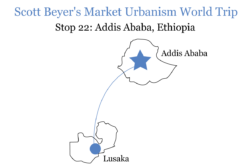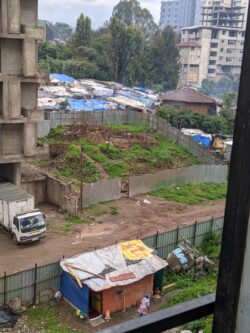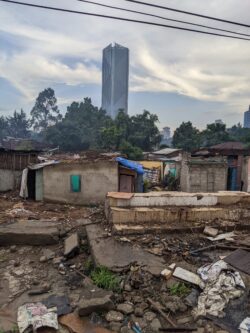Ethiopia: No Property Rights, Much Chaos
Constant human reshuffling within Addis Ababa shows how hard life is when governments own all the land.
I was navigating through the narrow alleys of a slum in Addis Ababa, Ethiopia’s capital city, watching the place get dismantled piece-by-piece. Young men worked together to haul scrap metal, tin roofing, clay walls and other materials from the neighborhood and onto large trucks. Standing in one man’s front yard, I was told through his daughter, the translator, of the multiple times in his life that he’s endured this ordeal.
“In Ethiopia,” she explained, “the government does not care if you own your home.”


Legally speaking, she was right. Ethiopia’s property system is similar to others in Africa and across the developing world. The government owns all land, and has broad authority to seize it. The constitution holds that individuals can lease land and own the property built on it, although if the man I interviewed is any indication, that aspect doesn’t seem to be honored either.
While land leasing systems have worked elsewhere, such as Singapore and Hong Kong, it doesn’t seem to in Ethiopia.
The larger context is that the country has for decades been racked with instability—be it socialist dictatorship, tribal conflict, or border disputes. The most recent example is prime minister Abiy Ahmed’s crackdown on the rival Tigray military forces, which has caused years of fighting, a half-million deaths, and millions more forced into refugee status. While the conflict is more complex than a mere land ownership issue, it doesn’t help that there is no legal framework for sorting out such territorial disputes. Instead, rival Ethiopian groups just drive each other off the land once they have their respective turns at power.

Some of these migrants, both within Ethiopia and from other nearby war-torn countries, end up in Addis. Once there they settle—again because of no formal property rights system—into illegal shanties, known as “villages,” effectively squatting on land. Addis has the most extreme mix of standard and sub-standard development I’ve seen. Within 100 feet in all 4 directions of my hotel—which was a luxury spot in one of Addis’ nicest neighborhoods—sat villages without running water, electricity or plumbing. People used the bushes as bathrooms, bathed in a nearby canal, and begged me for food whenever I left the hotel.
Roughly 2/3rds of Addis residents live in such villages. But because they have no legal claim to this land, they are ultimately disposable to the Ethiopian government. The slum dismantling that I witnessed just downhill from my hotel has occurred for decades in the city. People’s homes get razed and their possessions scattered on little notice. That land is redeveloped into business districts, government offices, and parks, in a process that locals say benefits politically-connected developers. Often such redevelopment is a form of political retaliation, with many Addis-based Tigrays, for example, getting driven from these villages and the country altogether. Other displaced slum dwellers get relocated to new large public housing complexes on the city’s outskirts. These too – not to sound like a broken record – come about through seizure of farmland. While the housing quality is higher than that found in Addis’ villages, wait lists are long and the units are located far from the city’s best jobs.
It should be apparent by now the chaos that surfaces from lack of private land ownership, at least in Ethiopia. Already the country, like others in Africa, has an unstable ethnic and tribal mix. Government land ownership is part and parcel to that – it causes unending disputes about who is entitled to what, and means land usage is tied to shifts in whoever holds power at the moment. It also runs counter to Ethiopia’s goal of redeveloping and modernizing Addis – who is going to build anything more than shacks when there is uncertainty about what would happen to any larger investment?
But the main victims are Ethiopians themselves, who are in a constant state of being scattered by their own government.
All images credited to Scott Beyer and The Market Urbanist.
Catalyst articles by Scott Beyer | Full Biography and Publications
